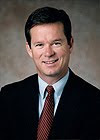U of L physician groups tied to Passport Health Plan must release salary and expense records, attorney general rules

Two groups representing University of Louisville‘s faculty physicians have been deemed public agencies and are subject to open records laws, Kentucky Attorney General Jack Conway has ruled. The groups therefore violated the Kentucky Open Records Act when they denied a request by The Courier-Journal‘s Tom Loftus for five years’ worth of records showing employee salaries, sources of income and expenses. U of L doctors have a majority on the board of Passport Health Plan, which manages the Medicaid program for Jefferson and 15 surrounding counties.
The matter concerns the University Physicians Association and the University of Louisville Physicians. In December, Loftus requested the salary and expense documents after state Sen. Tim Shaughnessy of Louisville, right, asked the Kentucky Health and Family Services Cabinet to “examine the flow of Medicaid funds from the state through Passport to UPA,” Loftus writes. State Auditor Crit Luallen did not look into the issue in her November report, which pointedly criticized Passport for excessive spending and conflicts of interest.
Though the physician groups contended they were non-profit corporations, Conway said UPA is a public agency “because it was established and created, and is controlled, by the University of Louisville School of Medicine,” Conway concludes. “In all material respects, ULP mirrors UPA in the manner of its establishment, creation and control … We are not prepared to casually dismiss these facts as ‘coincidence born of practicality,’ and instead find that ULP and the School of Medicine ‘act as one and the same.'”
In its articles of incorporation, UPA says its mission is “to further the research mission and teaching of the praction of medicine at the University.” Moreover, UPA and ULP were established and continue to be run by U of L medical school administrators, department chairs and professors. “We agree with The Courier-Journal that the suggestion that these physician administrators and/or professors, each the chair or interim chair of their respective medical school departments, came together of their own accord, and as private actors to establish and create UPA defies logic.”
Shaughnessy was impressed with the findings. “It causes me to ask: How could they think they are not a public entity? What remains to be seen is whether the university accepts this ruling or continues its arguments that it is not subject to public openness.” (Read more)
